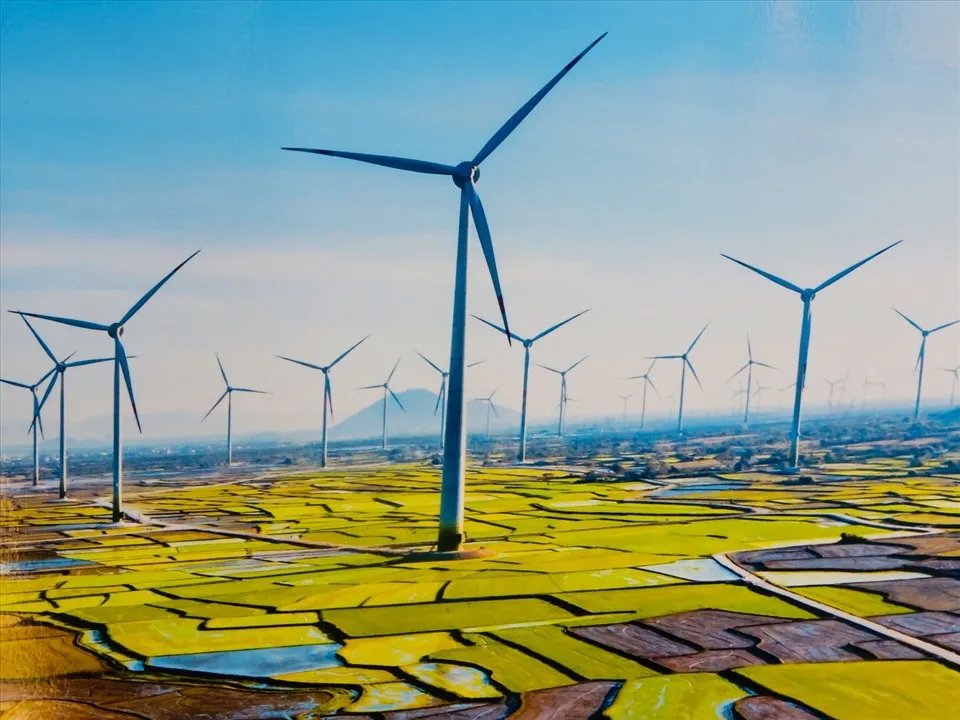
To clear this stalemate, the Business Association along with 36 investors has proposed some solutions to the Ministry of Industry and Trade to overcome shortcomings in the electricity pricing for power projects.
Stalled in pandemic
To be able to implement Vietnam's renewable energy development strategy and strengthen the Government's commitment made at the COP26 Conference in 2021, investments for total installed solar and wind power projects had risen to 26% in 2021 from a much lower level before 2019. However, due to the negative impact of the Covid-19 pandemic, there are now 84 renewable energy projects with a total capacity of 4,676.62 MW that are running behind schedule. This delay has led to an inability for these projects to obtain a fixed electricity pricing to function. This delay has affected around 34 transitional projects with a total capacity of 2,090.97 MW that have completed construction and have been tested and ensured for sufficient mobilization.
Investors have waited for a long time for the Government to issue a new electricity pricing as a premise for negotiating prices with Vietnam Electricity (EVN). The policy applied to transitional projects was recently issued by the Ministry of Industry and Trade through documents such as Circular 15, Decision 21, and Circular 01. However, the provisions in Decision 21 and Circular 01 have revealed legal inadequacies as well as highlighted the financial inefficiencies in the investment projects, which now face risk of bankruptcy.
If the new pricing policy is applied, then only 34 projects that have completed construction will benefit. Their total estimated investment capital is around VND 85,000 bln, of which about VND 58,000 bln has been financed by banks, hence there is a likely risk of financial failure, bad debts rising, and businesses and banks not being able to recover the capital amount.
Investor concerns
The Ministry of Industry and Trade seems to have acted far too hastily in issuing Decision 21 which does not guarantee a thorough appraisal or consultation. By assigning EVN to determine the pricing without consultation with an independent body is most inappropriate. Besides, the electricity pricing for solar power projects applied since 1 January 2021, and for wind power projects since 1 November 2021, has not yet been submitted by the Ministry of Industry and Trade to the Prime Minister for consideration as per provisions in Decision 13 and Decision 39. In Decision 21 there is no reference made to any directive by the Prime Minister. Hence, it can be assumed that the Ministry of Industry and Trade drafted Decision 21 without consulting with the Prime Minister, as required under Decision 13 and Decision 39.
Accordingly, the calculation results of EVN's proposed electricity generation price do not guarantee the principle of after-tax profit margin of 12% for investors in Circular 15. Besides there is an inconsistency between the electricity price of wind power projects and the EVN average retail price of electricity.
Recommendations
The Business Association along with 36 investors have requested the Prime Minister to direct the Ministry of Industry and Trade to implement and ensure that the issuance of electricity pricing for transitional projects is consistent with the provisions of the existing laws, as well as create an attractive environment for investors in the field of renewable energy.
Firstly, there is need to recalculate the electricity price bracket in Decision 21; fully comply with the procedures for promulgating the electricity price bracket for transition projects; hire an independent consultant to calculate the electricity price bracket and comply with the consultation requirements of the Advisory Council and the Ministry of Finance in order to ensure objectivity and transparency; and overcome all inappropriate points in the calculation process.
Secondly, there is a request to the Prime Minister to direct the Ministry of Industry and Trade to issue a new Circular on model power purchase and sale contracts applicable for transitional wind and solar power projects. Accordingly, these model contracts should retain their incentive policies for renewable energy. In which, first, the duration of the electricity purchase price for the transitional projects will be 20 years. Second, there must be flexibility for conversion of prices into US dollar currency and adjusted to any fluctuation in the Vietnam dong and US dollar exchange rate. Third, there is need to stipulate responsibility to purchase the entire electricity output from the renewable energy project at purchase price of electricity at delivery point. Only in this way will investors feel secure and will continue to invest and take interest in developing transitional projects. This is necessary to avoid economic loss or even cause the project to fail with the subsequent impact leading to increase of bad debt which is already a huge burden on the financial and banking system.
Thirdly, while waiting for the new policy, investors have proposed that projects that have completed construction be put into operation and power generation output be recorded and after the process of negotiating for electricity prices is complete the new price bracket can be adjusted.




















